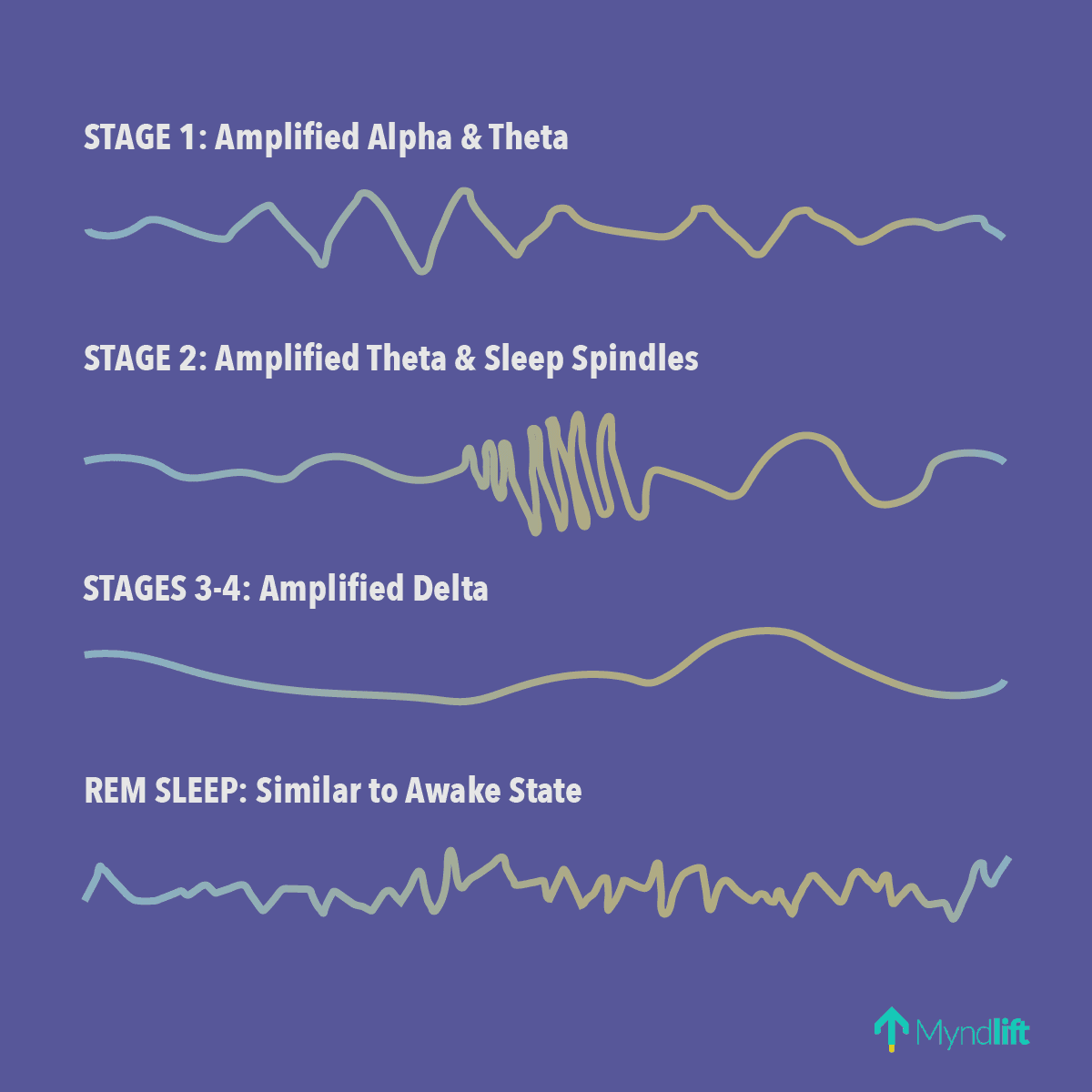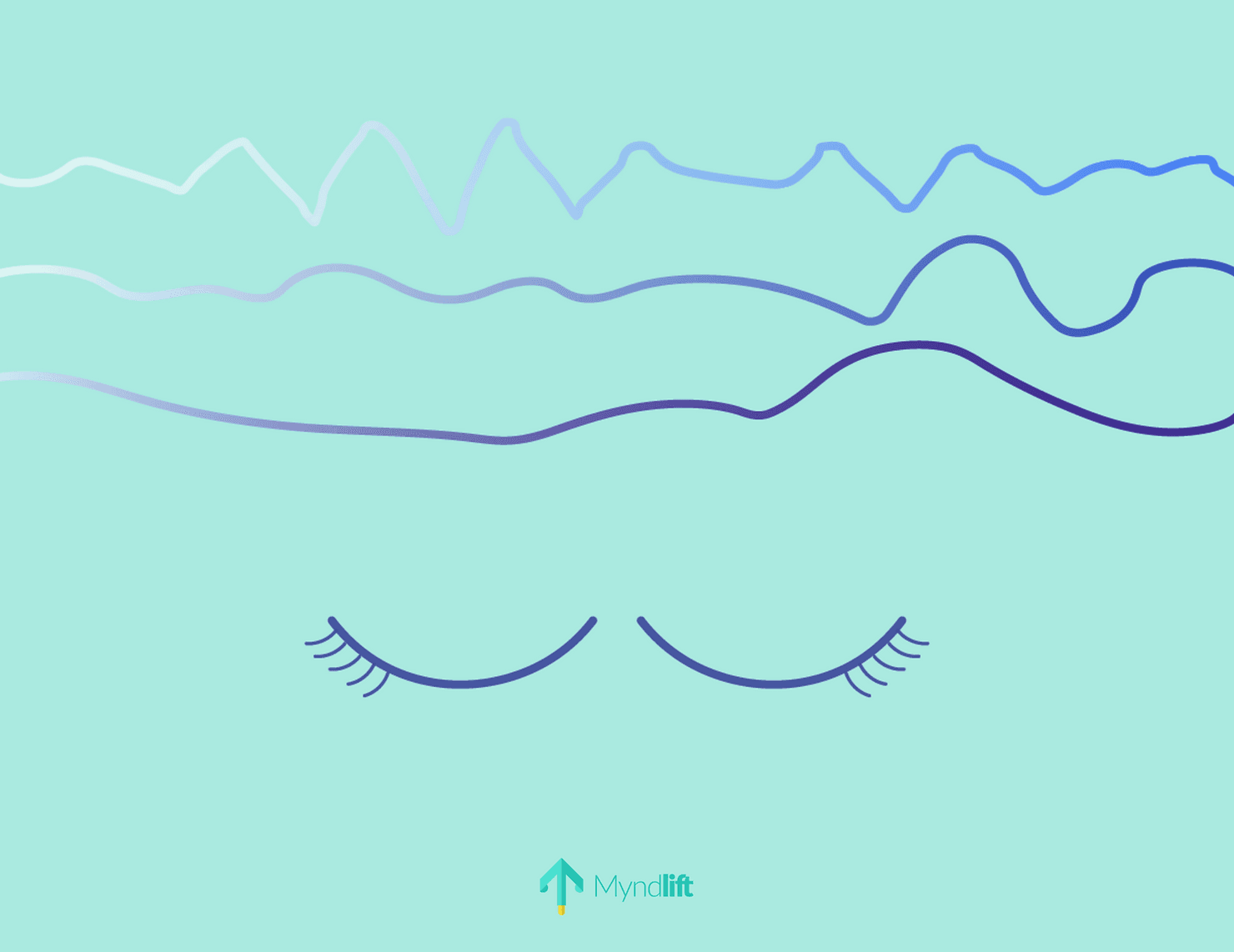Brought to you by Myndlift, creators of the leading home neurofeedback training platform.
You’ve probably heard the myth that once you hit your 20’s, you only need about 6 hours of sleep to function properly. You’ve probably even heard that most people have the ability to function on less than that.
Quite frankly, that isn’t true. In fact, 7-8 hours is the recommended amount of sleep you should be getting every night. A sufficient amount of sleep is imperative to keep your brain healthy and functioning to its full capacity.
So, while you might be inclined to check that email or scroll through your phone before calling it a night, that time could be better spent preparing your brain for the day ahead.
How Sleep Affects Your Brain
First and foremost, sleep helps you stay focused and keeps your brain sharp. This allows you to recall information more quickly and enhance your problem-solving skills.
Sleeping not only helps you process information better when you’re awake, but it even helps when you’re sleeping! Research finds that during sleep, information you learned during the day is reactivated (consolidated), making it easier for you to remember it later on.
Moreover, getting the proper amount of sleep boosts your creativity! Dreaming takes place during the REM stage of your sleep, and this stage is vital in contributing to your ability to come up with new ideas. Without it, you will spend your day feeling disinclined to be creative because you will be too focused on getting home, crawling under the covers, and laying your mind to rest.
During sleep, your brain puts in the work to clear out harmful toxins. By ridding your body of harmful molecules that build up throughout the day, your brain will be better equipped to fight off neurodegenerative diseases in the future, such as Alzheimer’s and Parkinson’s.

Sleep Stages Told Through Brainwaves
If you’ve read our previous blog on brainwaves, you might already know a bit about the brainwaves involved in various stages of your sleep cycle. If not, we’re here to explain what happens with your brainwaves during NREM and REM stages of sleep.
Stage 1: Throughout this stage of your sleep cycle, both alpha and theta brainwaves are amplified. Initially, in the early portion of stage 1 sleep, alpha waves are produced. These are relatively low frequency (8–12Hz), high amplitude patterns of brainwave activity. In general, alpha brainwaves are amplified during periods of wakefulness and relaxation and are dominant when you tuck yourself in and mentally prepare for a night of rest. If you train with Myndlift, some of you may recognize this as the state you aim for in the closed-eyes relaxation training exercise.
In the later part of stage 1 sleep, there is an increase in theta brainwave activity. Theta brainwaves are lower frequency (4–7 Hz) and higher amplitude brainwaves than alpha. Additionally, theta brainwaves are associated with dreaminess – both daydreaming and night dreaming – when your thoughts are free-flowing and detached.
Stage 2: In the transition to stage 2 of the sleep cycle, the body goes into a state of deep relaxation. Theta brainwaves dominate brain activity during this stage, but they are interrupted by “brief bursts of activity” known as sleep spindles. These rapid bursts of higher frequency brainwaves are believed to be important for learning and memory. Intriguingly, neurofeedback that enhances 12-15 Hz sensorimotor (SMR) activity has been shown to increase sleep spindles and lead to better sleep and improved memory. Myndlift's sleep improvement protocol is based on this research.
Stages 3-4: Delta brainwaves rule supreme when it comes to these stages of deep sleep. Delta brainwaves are low frequency (up to 4 Hz), high amplitude waves that are evident during the deepest meditative states and during these stages of dreamless sleep. In these stages, heart rate and respiration slow dramatically, and it becomes increasingly more difficult to wake someone from their slumber.
REM Sleep: REM, which stands for rapid eye movement, is a stage of sleep during which brainwaves are very similar to those observed when a person is awake. During REM sleep, dreaming occurs, and there is no voluntary muscle movement – with the exception of those muscles responsible for circulation and respiration, of course.
How You Can Sleep Better
Now that we’ve established the importance of sleep and the brainwaves that occur during downtime, here are the things you can do to ensure you’re catching enough Z’s on a nightly basis:
Try to avoid naps or at least limit napping to 20 minutes.
Avoid consuming less healthy substances such as caffeine and nicotine close to bedtime. Also try not to eat at least 3 hours before you go to bed (and definitely avoid junk food).
Maintain a regular exercise routine, but do not exercise too close to bedtime.
Optimize lighting throughout the day. Bask in sunlight during daytime hours – it will help keep your internal clock in check. But make sure to surround yourself with dimmer lighting close to your bedtime. This means that you should refrain from using your phone or laptop before you go to sleep. This helps you keep a regular sleep routine which is important for letting your body know when it’s time to call it a night.
Keep a pleasant sleeping environment. This means ensuring the room is dark and cool (between 60-67°F/16-19°C).
Make sure to relax and clear your mind before bed. To help you relax, you might try listening to relaxing music, reading a book, taking a hot bath, or meditating.
About the author:
Dubravka Rebic
Dubravka Rebic puts a lot of time and energy into researching and writing in order to help create awareness and positive change in the mental health space. From poring over scientific studies to reading entire books in order to write a single content piece, she puts in the hard work to ensure her content is of the highest quality and provides maximum value.




